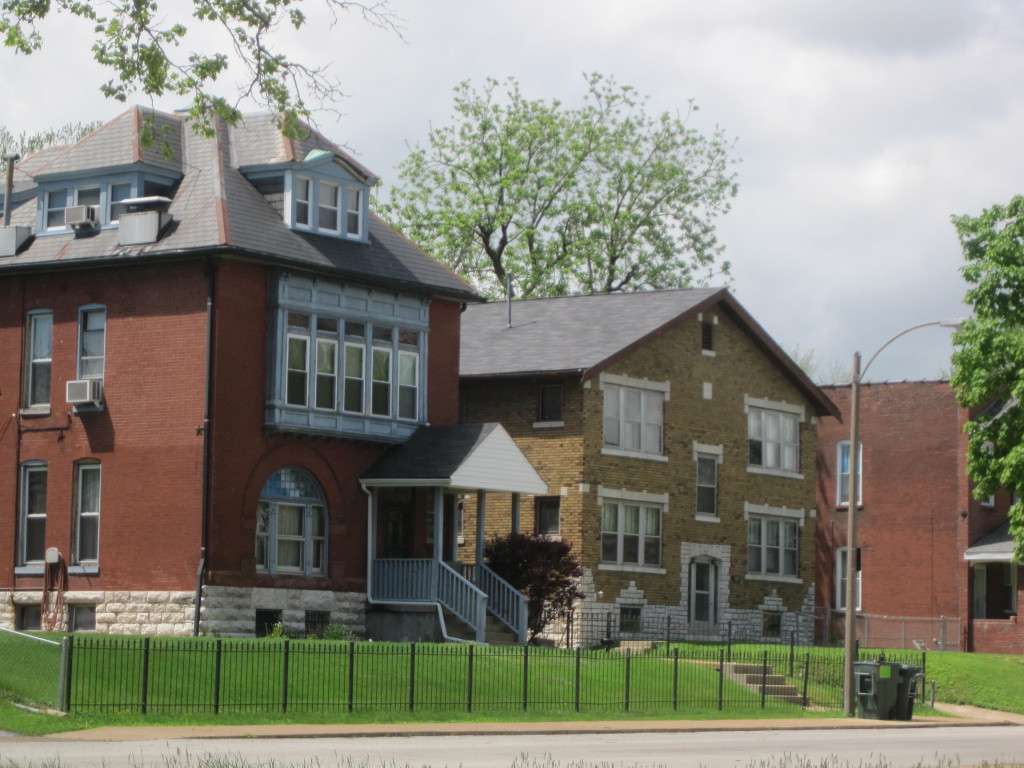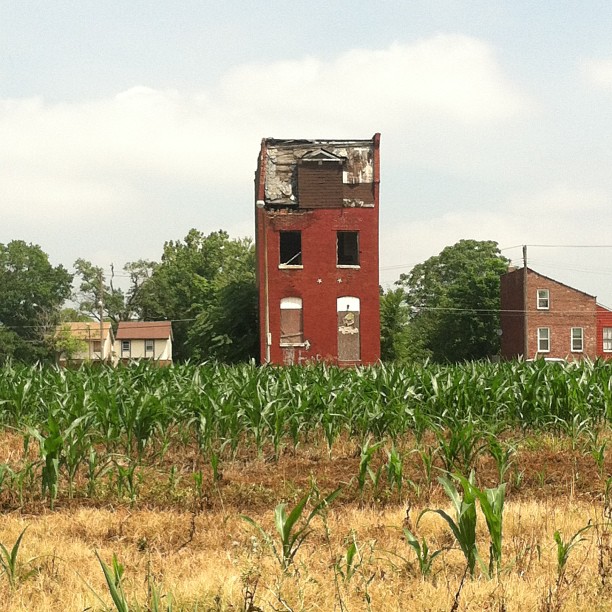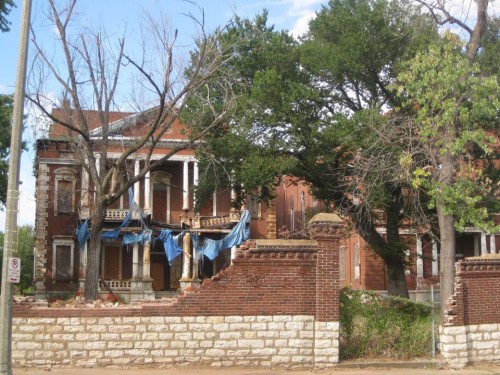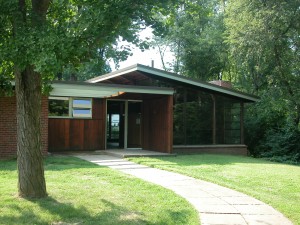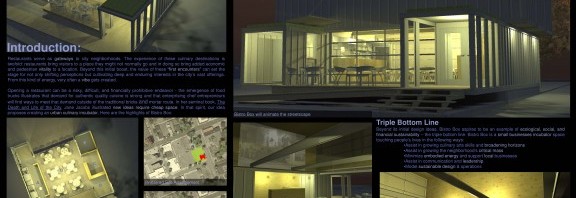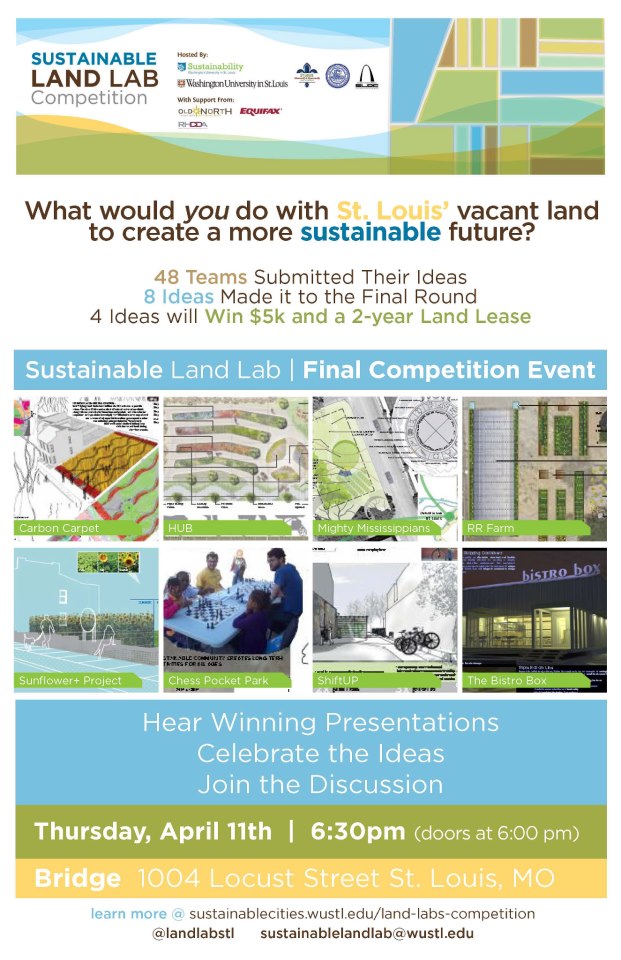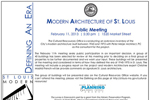by Michael R. Allen
The City Inside/Out
Opening Friday, June 7 from 5:00 – 7:00 p.m.
Sheldon Art Galleries
St. Louis’ built environment has been a yielding subject to many photographers over the years, from Emil Boehl to Charles Cushman to Toby Weiss. Each view transports us to a different city with the same name — or so the frozen images tease us to believe. The week closes with the opening of a large polyphonic urban photographic exhibit at the Sheldon Art Galleries, in which we find not only different cities but different frames.
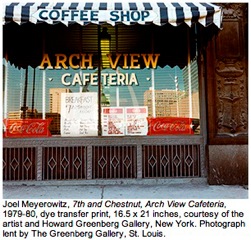 Amid our current fascination with remaking the Arch grounds, and consideration of our ongoing vacancy crisis, Joel Meyerowitz’s St. Louis and the Arch (1979-1982) series should be of heightened interest. Meyerowitz depicts the relationship between a modern monument and a city in transition. Roland Barthes’ punctum — defined in Camera Lucida as that photographic element that “pierces the viewer” — may well be off-frame, wherever the people missing from so many of the images may be (South County? Clayton?). The Meyerowitz images are over thirty years old now, and recent urban regeneration might cast them in a new light.
Amid our current fascination with remaking the Arch grounds, and consideration of our ongoing vacancy crisis, Joel Meyerowitz’s St. Louis and the Arch (1979-1982) series should be of heightened interest. Meyerowitz depicts the relationship between a modern monument and a city in transition. Roland Barthes’ punctum — defined in Camera Lucida as that photographic element that “pierces the viewer” — may well be off-frame, wherever the people missing from so many of the images may be (South County? Clayton?). The Meyerowitz images are over thirty years old now, and recent urban regeneration might cast them in a new light.
 Other photographers with work in The City Inside/Out include Andrew Raimist, Ken Konchel, David Johnson, Demond Meek, Alise O’Brien and Richard Sprengeler. Raimist drills down in Meyerowitz’s world to the surface of the Arch itself, capturing the vandal-created surface texture that belies its unitary skyline presence. Meek’s images of abandoned buildings, largely in isolation as if sprung from the unconscious upon the landscape, provide a reminder of the more troublesome impact of time on architectural beauty.
Other photographers with work in The City Inside/Out include Andrew Raimist, Ken Konchel, David Johnson, Demond Meek, Alise O’Brien and Richard Sprengeler. Raimist drills down in Meyerowitz’s world to the surface of the Arch itself, capturing the vandal-created surface texture that belies its unitary skyline presence. Meek’s images of abandoned buildings, largely in isolation as if sprung from the unconscious upon the landscape, provide a reminder of the more troublesome impact of time on architectural beauty.
Shifting Terrains: Works By Carlie Trosclair
Opening Saturday, June 8 from 7:00 – 11:00 p.m.
Drew Henry salon&gallery, 2309 Cherokee Street
Saturday, on kinetic Cherokee Street, the south side’s fastest-changing artery, there is another noteworthy opening. Carlie Trosclair will exhibit recent works in a show entitled Shifting Terrains at the Drew Henry salon&gallery. Some may recall being captured by Trosclair’s soft sculpture installations at various venues (although perhaps not in a river stream in Vermont). These fervent spatial occupations evince an originality desperately lacking in local hard-architecture practice and a searing psychological intensity that can simultaneously intimidate and mesmerize.
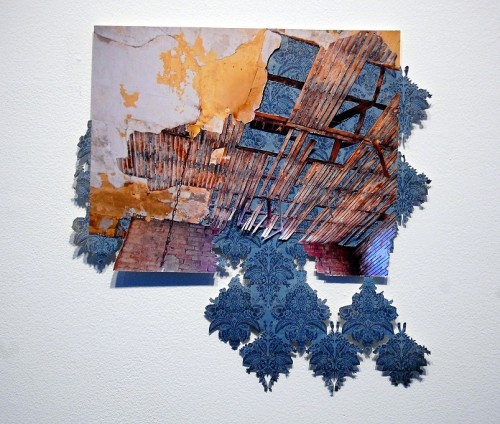
In Shifting Terrains, Trosclair offers an array of impressionistic entry points into constructed space. Her alterations to photographs of decayed interiors are a welcome break from the traditional gaze upon architectural ruin. By casting aside photorealism, these works evoke their subjects’ dreamlike — perhaps sometimes nightmarish — experiential nature more vividly than straight-on documents.
Architect Eric Mendelsohn wrote in Amerika that the American city was “unbridled, mad, frenetic, lusting for life.” While Mendelsohn was capturing traits of the twentieth century’s rapid urban pulse, Trosclair’s works suggest that even in decay our cities possess an energetic secret life. Perhaps even that life is more terrifying now that it comes from urban free-fall instead of controlled growth. Yet there may be a quiet order in urban trauma we don’t always detect — and Trosclair seems intent on finding that order.
